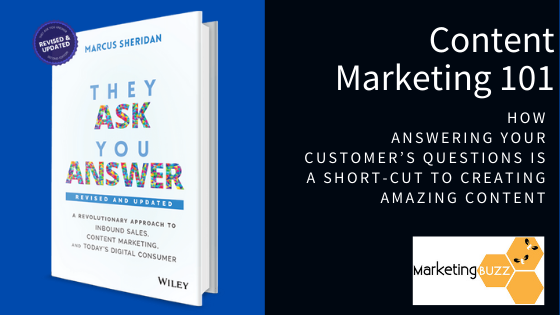Answering your prospective client’s burning questions on your website and social media content helps build trust and goes a long way to ‘selling’ you and your business.
Many people still struggle to know what content they should share on their website, client newsletter or on social media.
What to say and when? And what message will appeal to the people you want to attract to your business?
That’s why Marcus Sheridan’s ‘They Ask, You Answer’ approach to content marketing makes total sense.
A content marketing approach based on real business experience
Marcus Sheridan is a US-based author, speaker and overall sales and marketing guru.
But don’t hold that against him!
There’s no doubt he’s a confident communicator.
And though all that over-the-top, born-again sales spiel can be a little off-putting to some of us in Australia, his core message is sound.
As co-owner of a business called River Pools and Spas, he sold backyard pools and spas. His superpower was to use content marketing to drive people to his company’s website and support his salespeople in the process. By providing useful information to prospective buyers, he helped to build trust in River Pools way before customers were ready to buy.
According to Sheridan, the company has become one of the largest pool and spa suppliers in the US.
He now runs his own consulting company using the ‘They Ask, You Answer’ approach to advise others on how they can use content marketing successfully – to smooth the sales process and to sell more of whatever you sell.
Why answering all your prospect’s questions even before you speak to them works
I know what you’re thinking.
This ‘they ask, you answer’ approach sounds way too basic.
And you’re right.
But you’d also be surprised how few businesses actually do this well. They’re still stuck in the paradigm – ‘tell them what we want to know’ approach to marketing.
The old approach to selling and marketing was all about throwing out an enticing ‘hook’. Some sort of offer that leads people to pick up the phone or visit your premises to find out more.
Don’t get me wrong, having a good offer is still important.
But content marketing has introduced the idea that by offering helpful content, people will come to know and trust you – and then buy.
Having information on your website that prospective buyers are interested in will keep people on your site longer. This usually means that they’re more likely to purchase.
What information could you share on your website and social media that would make them want to read more?
There’s all the obvious stuff. Benefits and features. Case studies. Testimonials.
But you should also include all those questions businesses often avoid. The negatives.
Questions that people mightn’t ask you to your face if they had the opportunity. They’re often the questions people really want to ask.
- Questions about if the product is ‘really worth it’.
- Are there problems using the product?
- What’s the price or the ‘real cost’ of your product or service?
The key is to address these questions before they become a concern – a concern that will stop people from buying. These issues are things that will frustrate them if they go to your website looking for an answer and don’t find it.
Honest and transparent content that’s helpful is the key to building trust and building your business
Content that works addresses people’s fears, worries and concerns.
And content that educates and informs people really works.
This information isn’t marketing ‘fluff’. It really helps people be comfortable with their buying decisions.
The advantage for you is that it speeds up the sales process because people are a step or two closer to making the decision to buy.
After all, most of their questions have been answered, worries have been solved.
How to start your They Ask, You Answer approach to content marketing
To get this working you need to set-up a system. Unless you do, it just won’t happen.
- Think about all the questions that your clients and prospective clients ask
- Then prioritise those questions
- Set-up a content calendar so you have an editorial calendar to address those key questions.
- Centralised sales content hub which your sales team can use to help them resolve client objections. This doesn’t need to be complicated. Just easy to get to by everyone who needs the information.
I recommend you buy the book. But if you’re not a reader and prefer to settle in with the popcorn and watch this video where Marcus Sheridan presents his ideas explored in They Ask, You Answer right here.















